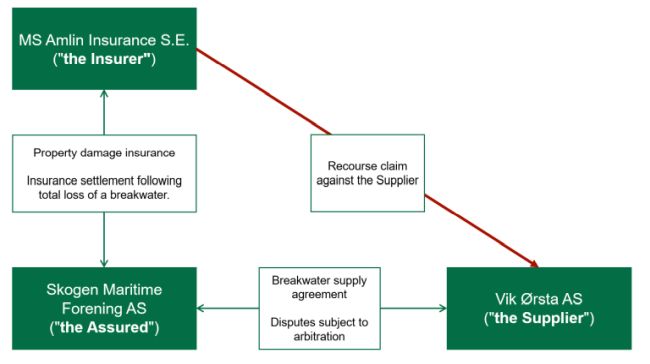This update explores trends and developments within international commercial arbitration seen from a Norwegian perspective.
AI is on "everyone's" lips these days and the EU is working with high speed on how to tackle the potential challenges relating to these powerful tools. The use of AI, and what it will mean for counsels and arbitrators going forward, is impossible for anyone to predict, but we do know that it will bring changes. When asking ChatGPT for the latest trends within international arbitration seen from a Norwegian perspective, the answer started with the following:
As an AI language model, I do not have access to up-to-date news articles or the ability to monitor news feeds in real-time.
So clearly there is still need for newsletters written by humans – and in this one you will get our high level input on the question ChatGPT gave up on.
Success and Mediation Window
When a dispute is brought before an arbitral tribunal, objective success is a transparent and efficient process towards a final, enforceable solution – either through agreement or an award. Even if an arbitration is initiated, it is important that the parties either revisit or start to explore the possibility of a negotiated solution. Our general experience is that many parties at this stage of the process, regardless of previous attempts to settle the case, are "afraid" of making the first move towards e.g. agreeing on a mediation process to avoid looking weak.
This point was raised during a panel discussion during the 23rd Annual IBA Arbitration Day – and the session chair, Lucy Reed, argued the following (quoted from the report on panel discussion at the 23rd Annual IBA Arbitration Day):
Following on from the midstream meeting, Reed proposed a further 'mediation window' for the parties to consider mediation. As the mediation window would be set in the procedural timetable, the parties would have an organic window to consider settlement without the misconception that, by asking for it, they would look weak."1
Making a mediation window in the procedural timetable has arguably been part of Norwegian/Nordic best practice for some time. In the Nordic Offshore and Maritime Arbitration Associations' (NOMA) Best Practice Guidelines, the CMC-matrix sections 1.13 and 1.14 encourages the parties to agree during the first Case Management Conference to allocate time for mediation/settlement discussions. In addition, the CMC-matrix also suggests that the arbitral tribunal appoints a mediator on behalf of the parties.
In our view it is important that the arbitral tribunal is driving the process on this point and that it is familiar with the potential benefits of a mediation and the framework necessary to ensure the best possible basis for a successful process. On this point it is noteworthy that NOMA recently launched the NOMA Mediation Rules and a NOMA Model Mediation Agreement. According to NOMA, these rules have three important features:
- they provide the parties with a well-balanced, specific and practical approach to establish an effective and transparent mediation,
- they are based on "best practice" and aligned with the UNCITRAL Mediation Rules 2021, and
- they offer the opportunity to have a settlement enforceable through a short and simple arbitration procedure.
We agree to this, but an additional important feature also lies in the practical approach of the NOMA Mediation Rules. In our view they offer a more structured approach than what can usually be found in comparable mediation rules. This may prove especially useful for parties that are not so familiar with mediation procedures. On this point there are differences even within the Nordic countries – where mediation is more commonly used in Norway and Denmark compared to Sweden and Finland. However, there may be a shift in place here making mediation more acceptable as an alternative dispute resolution mechanism across the Nordics.
Use of NOMA arbitration picking up speed
Another trend in Norway (and Denmark), is the increased use of NOMA arbitration (both ordinary and fast track) for disputes within the offshore and maritime industry. We are therefore happy to see the publication of the first NOMA award pursuant to the Nordic Marine Insurance Plan, and an anonymised award from Denmark pursuant to a bunker agreement.
As highlighted by NOMA when publishing the latter award, it is noteworthy that NOMA arbitration is agreed between parties registered outside the Nordics and that this corroborates with general feedback from market players who emphasise that NOMA arbitration regularly is included in the jurisdiction clause for contracts relating to the maritime and offshore industry.
In our practice we see the same development. In addition we also see a wide use of the NOMA Best Practice Guidelines in Norwegian ad hoc arbitrations – regardless of whether it is maritime arbitration or not. We support this development as the use of these guideline secures a more transparent and efficient arbitration process.
The Norwegian Supreme Court clarifies third-party effects of arbitration agreements
On 30 March 2023 the Norwegian Supreme Court handed down a judgment relevant for commercial arbitration in Norway (HR-2023-573-A). Below is an overview of the involved and related parties:

The question was whether the Insurer, who sought recourse from the Supplier, was bound by the agreement to arbitrate in the contract between the Assured and the Supplier.
According to the Norwegian Arbitration Act, section 10, when a legal relationship subject to arbitration is transferred, the arbitration agreement is included in the transfer.
The Insurer argued that the provision only applied for transfers of entire legal relationships and not for transfers of individual claims. Moreover, the Insurer argued that the provision only applied where the claim had been transferred by agreement, and not where the claim had passed to the claimant by operation of law.
The Supreme Court rejected the Insurer's assertions. It held that the Norwegian Arbitration Act, section 10, also applied for claims that had been transferred separately. Furthermore, it held that the provision applied where the claim had been transferred to the claimant by operation of law. Accordingly, the Insurer was bound by the arbitration agreement between the Assured and the Supplier, and the dispute was not admissible to the ordinary courts.
In our view the Supreme Court's conclusion was as expected. We are surprised to see that the Insurer challenged the Supplier's right to have the recourse claim arbitrated. However, it is now settled law that insurers seeking recourse based on a contract concluded by the assured are bound by arbitration agreements in such contract.
What's on the agenda?
The arbitration year 2023 was kicked off with the Norwegian Arbitration Day on 26 January in Oslo – with the following main topics: "Trends and challenges in Norwegian Arbitration", "PO1 as a vehicle to ensure effectivity, predictability and transparency – best practice" and "Expert Witnesses – best practice".
In our view a clear trend is the rising awareness regarding the importance of a well-structured first CMC and the use of PO1 as a tool for securing an effective arbitration process. We thus see a development where more effort and time is used by the arbitral tribunal to make a PO1 in line with what is considered international best practice – but still maintaining the Norwegian/Nordic pragmatic approach.
On the international commercial arbitration "scene" there are many potential events to choose from. From our perspective the following upcoming "local" events may be considered:
- 12 May 2023: Helsinki International Arbitration Day organised by The Finland Arbitration Institute
- 31 May 2023: GAR Live Stockholm 2023 (hosted by SCC Arbitration Institute)
- 5 October 2023: Copenhagen Arbitration Day organised by Danish INstitute of Arbitration
Footnote
1. Friday 25 March 2022, presented by the IBA Arbitration Committee
Originally published 10 May 2023
The content of this article is intended to provide a general guide to the subject matter. Specialist advice should be sought about your specific circumstances.



